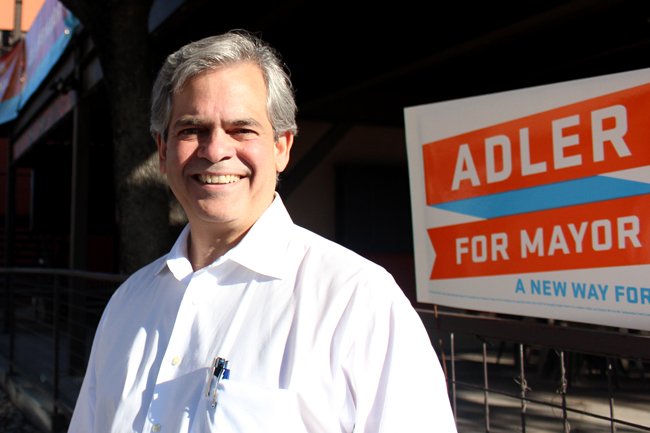
If you think about it for a minute, it doesn’t make a whole lot of sense that Austin Mayor Steve Adler got stuck in a fight with Uber and Lyft.
(Article by Noah Kulwin, republished from http://recode.net/2016/03/16/meet-austin-mayor-steve-adler-the-guy-caught-between-a-rock-and-uber-and-lyft/)
Adler is a progressive Democrat in charge of a deeply blue city in one of the reddest states in the country. Among the members of the city’s burgeoning tech scene, he has been considered a friendly official with close ties to local industry figures like Entrepreneurs Foundation CEO Eugene Sepulveda. While there was a lot of City Council wrangling over issues like how to regulate short-term rentals such as those on Airbnb and HomeAway, Airbnb didn’t go to war over it.
The debate over Uber and Lyft, on the other hand, has been a different story. The ride-hailing services adamantly oppose regulations that require mandatory fingerprint background checks of its drivers. Adler and the City Council, pushed by advocates for victims of sexual assault, passed an ordinance late last year that would have mandated such checks. In February, the council approved a purported compromise initiative that would allow drivers who agree to such background checks by the city to get a credential allowing them to pick up riders in places like the Austin airport or downtown.
Uber and Lyft, who argue that such a program isn’t really “opt in” at all, have decided to take their fight to the ballot box. The two companies gathered 63,000 signatures — about 20,000 more than needed — on a petition to require the City Council to adopt “commonsense” ride-hailing rules that don’t include the checks.
In early May, Austin voters will get to decide whether or not they support Uber and Lyft. But tensions are running high. Already, a shadowy pro-car service group called Austin4All, which Uber and Lyft say has no connection to them, has tried to force a recall vote of one City Council member. Uber also filed a motion early March that called the ballot vote language “misleading” and asked the state Supreme Court to force the City Council to rewrite it.
In a conversation with Re/code, the soft-spoken Adler talked a bit about Uber, Lyft, Austin and how the city stumbled into one of the ride-hailing sector’s most heated battles yet. This conversation has been edited for length and clarity.
Re/code: One of the questions that’s bugged me since the beginning of the Uber and Lyft fight in Austin is, well, why Austin? And why have you and the City Council decided to take this on?
Mayor Steve Adler: I think the question — what is the intersection of government interests and the new economy? — it’s something that’s unclear. People are working through that. I think this is an example of working through that in motion. I think what happened here is the effect of a series of events that are not necessarily in terms of setting out a large plan.
So you’re saying that there wasn’t some grand strategy?
I think that would be correct.
Then how did the fight over the ordinance passed last fall begin?
We had some people who were adherents of TNCs [transportation network companies] and Uber and Lyft who recognized the validity of Uber and Lyft in taking drunk drivers off the road. We were also hearing that fingerprinting would be helpful, from [rape crisis centers and victim advocacy organizations], who reported a sudden and dramatic increase in the number of women, mostly young women, who were victims or were coming forward as victims of sexual assault. We had these two camps, both pushing for a different aspect of safety. And we passed a resolution which I think was incomplete. And I began trying to fashion a solution.
In San Francisco, for example, Airbnb went to the ballot in a fight that many saw as sort of a proxy between new, techie interests and people who have lived in San Francisco awhile. Do you see those same tensions here with the upcoming ballot vote?
I don’t know. In some respects, I think the ballot initiative fight here was premature. I think had the ballot initiative not started, we [the City Council and the TNCs] would have come back as a council in late January, and we would have worked through a lot of these issues.
I think we could have worked through this in a way that would have avoided controversy, and would have not been in a position like Portland, where the regulators just gave up. Or like San Antonio, which tried to fashion a different type of solution, but didn’t really fingerprint at scale.
Well, in Portland, Uber began operating in every market that surrounded the city and basically forced the city to cave to consumer demand. What would you do if something similar happens here? Or if consumers back Uber and Lyft at the ballot box, that would suggest they think you don’t represent their interests. What would you do in that case?
Well, with respect to the vote that’s coming up, a “Yes” vote adopts the ordinance as supported by Uber and Lyft, and that doesn’t really address on its face the ability to fingerprint drivers at scale. And a “No” vote addresses fingerprint checks, but doesn’t really address having TNCs at scale. So, how do you vote in an election like that? I’m not sure what we’re really learning in this election. I’m not sure the lines are clearly drawn in this election.
Someone who wants to have fingerprinted drivers at scale in this election, I’m not sure how they vote.
Read more at: http://recode.net/2016/03/16/meet-austin-mayor-steve-adler-the-guy-caught-between-a-rock-and-uber-and-lyft/

